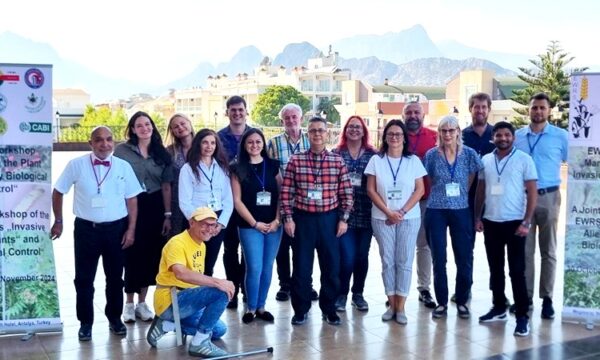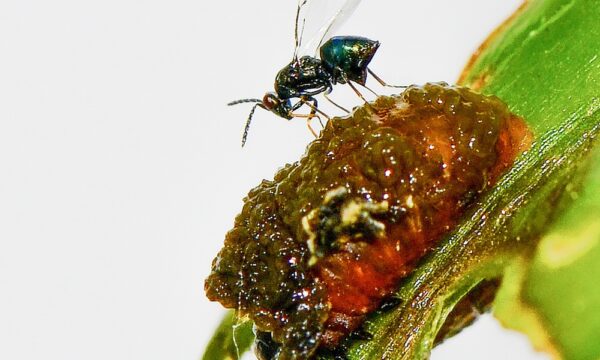In March 156 delegates from 24 countries travelled to the Kruger National Park in South Africa to attend the XIV International Symposium on Biological Control of Weeds (ISBCW) which was held at the Nombolo Mdhuli situated in the Skukuza Camp (2 – 7 March 2014). This quadrennial international symposium is a prestigious conference which provides delegates with an opportunity to present novel research on all aspects of biological weed control, to reflect on past experiences and discuss the way forward for the discipline and – this goes without saying – to catch up with old friendships and forge new ones. Three years on from the previous symposium in Hawaii and timed to commemorate “100 years of weed biological control in South Africa” 1, the African continent hosted the meeting for the second time in its history (the first time being the IX ISBCW held in Stellenbosch, South Africa in 1996). However, perhaps partly because of the increasingly severe constraints on funding and failure to gain official approval from respective governments/organizations, which made it impossible for many people to attend, this year’s symposium saw lower delegate numbers than previous ones. Some of the traditional “strongholds” in weed biocontrol, i.e. Australia, USA and Canada were clearly underrepresented, while the high number of European participants reflected the rapidly increasing interest in weed biocontrol in this part of the world. Sadly, apart from the participants from South Africa, only one other African country (Kenya) was represented. Last, but not least, it was an important and positive feature of attendance at this symposium that up-and-coming, younger scientists from all over the world were very well represented and the presence, prominence and enthusiasm of the next generation of weed biocontrol scientists at the XIV ISBCW seems to bode well for the future of the discipline.

Nombolo Mdhuli Conference Centre, Skukuza Rest Camp, Kruger National Park. Host venue for the XIV International Symposium on the Biological Control of Weeds (Photo: Marion Seier)
The adventurous choice of venue in the largest camp in Kruger National Park, situated in the southern part of the park on the banks of the Sabie River, offered a conference setting with an exceptional African flair and many opportunities to meet the local Skukuza camp wildlife, including monkeys, bushbabies and even the odd “stray” hyena. The symposium was skilfully and imaginatively arranged by a small organizing committee (Fiona Impson, Carien Kleinjan, John Hoffmann, Andrew McConnachie, Martin Hill, Llewellyn Foxcroft, Julie Coetzee, Jackey Deacon). Following the dawn chorus at 05.30 when visitors went on ‘game drives’, the serious business of the conference proceedings took place throughout the day which ended with an evening drive, or a social event that inevitably extended well into the night.
The interesting and well-balanced scientific programme was structured into two opening addresses: “The enigmatic past, present and future of African grasslands” delivered by William Bond (University of Cape Town) and “Celebrating a century of weed biological control in South Africa” presented by John Hoffman (University of Cape Town). These were followed by nine thematic sessions which saw 130 oral contributions catering for all scientific interests:
Session 1: Exploring new biological control possibilities;
Session 2: Exploration and host specificity testing of promising agents;
Session 3: The efficacy of proposed or established biological control agents;
Session 4: Post-release evaluation of biological control agents;
Session 5: Risk assessment;
Session 6: Interactive effects in biological control;
Session 7: Biological control in the “developing” world;
Session 8: Management and implementation of biological control; and
Session 9: Diminishing resources despite effectiveness of biological control.
In addition to the traditional 15-minute oral presentations, for the first time in the history of the symposium 5-minute ‘speed-talks’ had been allocated for poster presentations rather than the traditional poster sessions with designated board displays. These novelty speed-talks were an outstanding success, giving younger and perhaps less well-known scientists an opportunity to present orally the essence of their research (backed up in most cases by hand-outs outlining the synopsis of the talk) and giving the audience the chance to put faces to names.
Furthermore three evening workshops were held during the course of the meeting addressing the topics “Eupatorieae” (i.e. mostly discussions on Chromolaena odorata); “Tamarix” and “Barriers to biological control in the developing world”.
Preceded by the CABI bid to host the XV ISBCW symposium in the alpine resort of Davos, Switzerland in 2018 – a bid which was unanimously accepted – the closing address was delivered by Marcus Byrne (University of the Witwatersrand) who gave an entertaining and fascinating account of the complex biology of dung beetles, a group that has featured in biological control for decades with several species from southern Africa imported into Australia to disrupt the breeding of fly-populations in mammalian dung.
Throughout the conference the professionalism and hospitality of the South African hosts shone through every aspect, thus making the meeting a memorable event for all. The proceedings of the meeting will be, for the first time, produced as a CD rather than as a book and will also be available in PDF format on the ARC/PPRI website (http://www.arc.agric.za).

CABI staff and associates, past and present at XIV International Symposium on the Biological Control of Weeds
A more comprehensive account of the XIV ISBCW held in South Africa, March 2014 is available in the June edition of Biocontrol News & Information here.
Dr. Marion K. Seier
Senior Scientist, Invasive Species Management, CABI
1 Comment
Leave a Reply
Related News & Blogs
Biological control in action: Zambia’s field days on fighting fall armyworm
Experts from CABI recently held two field days and an expo in Zambia, showcasing innovative approaches to pest management to 584 farmers, agro-dealers and other stakeholders to help raise awareness of approaches to tackle the invasive fall armyworm (Sp…
11 June 2025






Thank you for the very important message…
Best Regards,
Henry Capelle Chief of Agriculture & Quarantine Ministry of Resources and Development Republic of the Marshall Islands Tel: (692) 625-3206/4020 Fax: (692) 625-7471 Cell: (692) 455-4920 Email: kikurto@yahoo.com